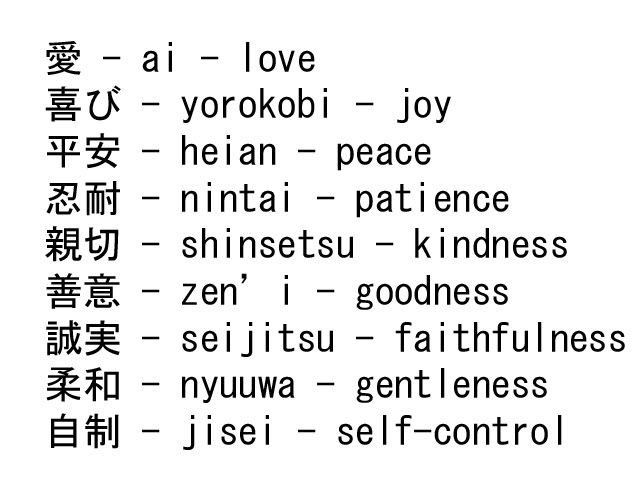Page 1 of 1
help finding the fruit of the spirit in Japanese
PostPosted: Wed Jul 29, 2009 7:05 pm
by firestorm
hey guys long time no see just wondering if you could help me.
you see I'm making a sword stand for these 2 katanas that I have and I wanted to have the Fruit of the Spirit in Japanese in the front. I think I can find love but I need help finding the rest. please also note my computer can't display asian languages. (xp trial version only for now til we finish fixing it.

) so any pictures of the symbols would be wonderful.
PostPosted: Wed Jul 29, 2009 8:52 pm
by EricTheFred
According to my Japan Bible Society translation, these words as used in Gal. 5:22 are "Mitama no Mi".
How to write this is the problem. I don't know how to post this without using fonts. Here's some instructions for anyone who knows how to come up with a picture for you:
"Mitama" - I'm reading 'Mitama' from the furigana (little hiragana written next to the Kanji). I don't find this word in either of my Japanese dictionaries. It's written with two Kanji. The first is "GO" (the character used for the honorific "Go-" such as in words like Gokazoku ("your family".) The second is "REI" (meaning 'spirit') The kun reading of this "REI" is "tama', so that's the second two syllables, which means the 'mi' is somehow being indicated with "GO". I have no idea why this works.
"no" - is of course the hiragana character.
"Mi" - is written with the character "JITSU", which is used in kun reading as 'mi' for fruit.
PostPosted: Thu Jul 30, 2009 4:38 pm
by firestorm
EricTheFred (post: 1333106) wrote:According to my Japan Bible Society translation, these words as used in Gal. 5:22 are "Mitama no Mi".
How to write this is the problem. I don't know how to post this without using fonts. Here's some instructions for anyone who knows how to come up with a picture for you:
"Mitama" - I'm reading 'Mitama' from the furigana (little hiragana written next to the Kanji). I don't find this word in either of my Japanese dictionaries. It's written with two Kanji. The first is "GO" (the character used for the honorific "Go-" such as in words like Gokazoku ("your family".) The second is "REI" (meaning 'spirit') The kun reading of this "REI" is "tama', so that's the second two syllables, which means the 'mi' is somehow being indicated with "GO". I have no idea why this works.
"no" - is of course the hiragana character.
"Mi" - is written with the character "JITSU", which is used in kun reading as 'mi' for fruit.
well not exactly what I meant. I mean what's the symbols for love, joy, peace, patience, kindness, goodness, faithfulness, gentleness, and self-control, those are the ones I'm looking for. Thanks for your help none the less ^-^. I really appreciate it ^-^!
PostPosted: Thu Jul 30, 2009 5:05 pm
by ShiroiHikari
I looked up the verse to find the exact words they used, and here they are.

PostPosted: Thu Jul 30, 2009 5:38 pm
by firestorm
YAY YAY YAY YAY YAY! thank you thank you!
now i'm really happy ^-^ I just need to figure out the stroke order now cause I want to do it correctly ^-^.
PostPosted: Fri Jul 31, 2009 8:25 am
by EricTheFred
Thanks for the backup, Shiroi. I didn't have a chance to pull my .jp Bible back out yesterday and get this.
By the way, how did you put together the image? Very handy.
Also, do you have the mystery word 'Mitama' in any dictionary? I'm very curious about what 'Mi' is this, and why is it getting written with that particular Kanji?
PostPosted: Fri Jul 31, 2009 4:31 pm
by ShiroiHikari
I used Photoshop for the image. :]
As for "mitama", the "mitama" I found in my dictionary is this: 御霊 and it says it means "spirit of a deceased person".
PostPosted: Mon Aug 03, 2009 7:25 am
by EricTheFred
Well, that's indeed GO + REI, the kanji that's in my Japan Bible Society translation for 'Spirit' (in the context of Gal.5:22). Apparently they are using a different meaning here. Otherwise, that's a pretty strange rendering of 'Fruit of the Spirit.'
The kun reading for the first is apparently 'mi', but in my kanji guide it only gives 'on'. I guess I will need to pencil 'mi' in.
Thanks.
 ) so any pictures of the symbols would be wonderful.
) so any pictures of the symbols would be wonderful. ) so any pictures of the symbols would be wonderful.
) so any pictures of the symbols would be wonderful.